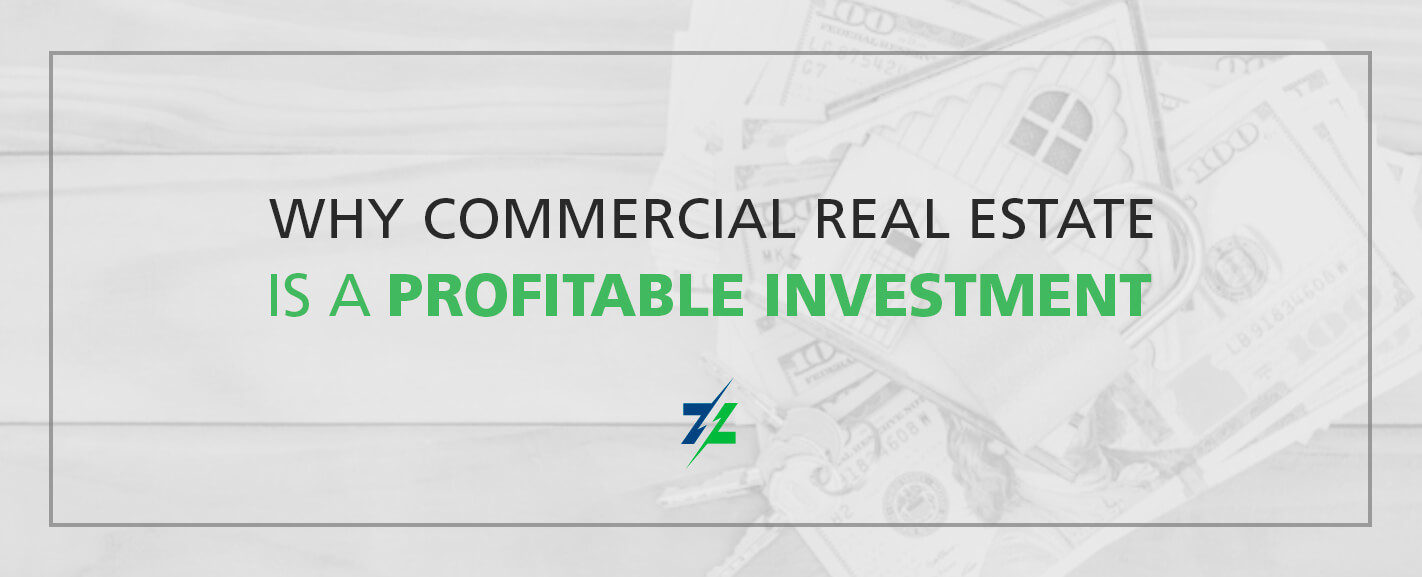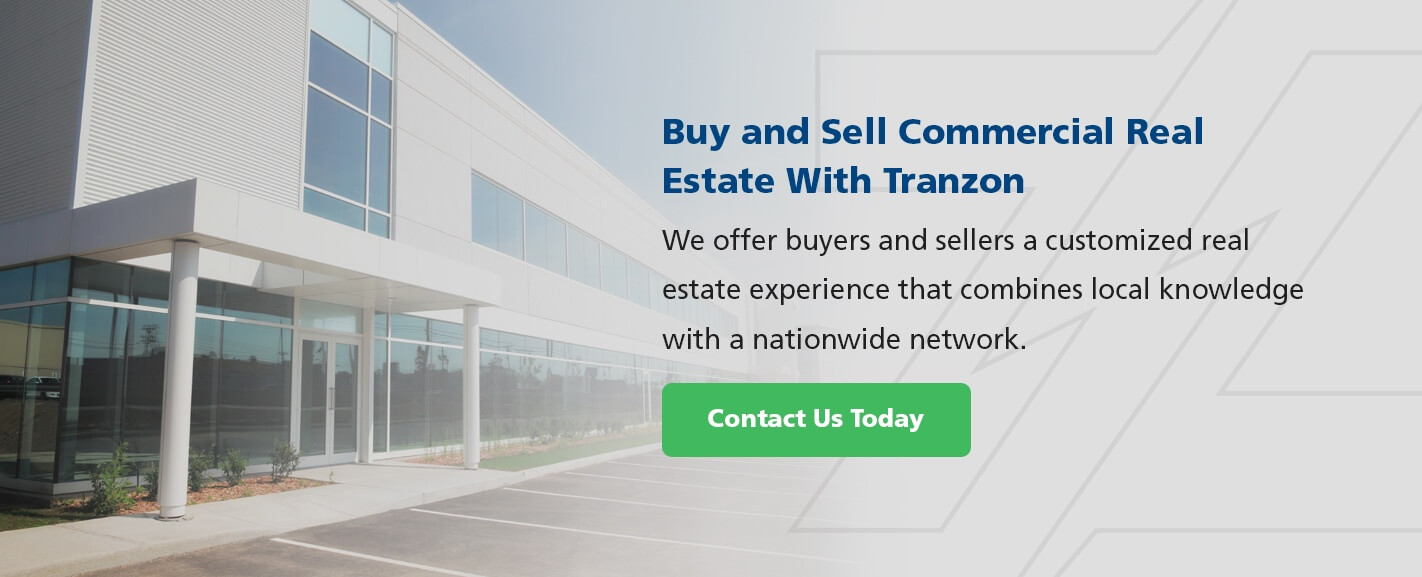
People interested in investing in real estate have to make some choices. One of the most significant decisions they need to make is the type of real estate to invest in. Although some might argue that "property is property," there are substantial differences between purchasing residential real estate and buying commercial properties.
Understanding the differences between commercial real estate and other types is just the first step towards understanding why commercial real estate can be a profitable investment. Learn more about the benefits and challenges of investing in commercial real estate and how to get started buying and selling commercial property.
How Commercial Real Estate Is Different From Other Real Estate
In the U.S. in 2018, the total value of all commercial real estate was estimated to be between $14 and $17 trillion. The simplest way to define commercial real estate is a property that earns income for the person or entity that owns it. Commercial properties might generate income for their owners by being sold, rented out or used for other business purposes.
Commercial real estate is often compared to residential real estate. Residential real estate includes homes and small apartment buildings where the owner lives in the property. Residential property is a home or apartment building with anywhere from one to four units in it. Properties with five or more residential spaces are typically considered commercial multi-family properties, as they are often rented out to tenants, and the owner earns a profit.
One considerable difference between residential and commercial real estate is the way that the two categories of real estate are valued. If a person is interested in buying or selling a residential property, they will often look at the prices of comparable homes in the area to get a sense of how much a home is worth.
Before buying commercial property, an investor typically calculates the capitalization rate to get an idea of the value of the property. The capitalization rate is the estimated annual rate of return on a property. To calculate the capitalization rate, you divide the net annual operating income of the property by its cost. Usually, the higher the cap rate, the better.
Calculating the cap rate of a commercial property allows an investor to see whether or not the purchase would be a good investment initially. If they do purchase the property, calculating the cap rate in subsequent years allows them to see whether or not the property remains a good investment. It might be that the investor needs to make adjustments to make the property more profitable. For example, an owner might need to increase the amount of rent they charge on a property if its value increases over time. Raising the rent would help to increase net income and the capitalization rate.
Types of Commercial Real Estate

In contrast to residential real estate, there are many categories of commercial real estate. In addition to multi-family properties, commercial real estate categories include:
-
Retail
-
Industrial
-
Office
-
Hospitality
The retail category includes individual stores as well as large shopping centers and malls. Restaurants and other establishments that serve food typically fall into the retail category, too.
Industrial real estate includes warehouse buildings and factories. The office category includes massive skyscrapers with hundreds of offices, as well as smaller buildings with just one or two offices.
Real estate in the hospitality category includes hotels and motels, as well as resorts. Individual rooms or apartments rented out through websites such as Airbnb typically aren't considered commercial real estate.
Land vs. Commercial Real Estate
Although land can eventually be used for commercial reasons, the process of buying or selling land isn't the same as the process of buying or selling commercial real estate.
When you purchase land, it is often zoned for one type of use. For example, you might buy land zoned for residential use or retail use. It's sometimes possible to rezone the land if you hope to use it for a different reason, but doing so can take time and cost more money.
Even if the land is already zoned commercial, it can be risky developing a building on speculation or challenging to find a tenant willing to negotiate a build-to-suit lease.
Who Buys Commercial Real Estate?
The people or entities who purchase commercial real estate generally fall into three categories. They might be investors who are hoping to earn income off the real estate, through renting it out to tenants for instance. Investors can be individuals or a group of institutional investors.
Commercial real estate buyers might be business owners who are looking for a place for their company. The third category of commercial real estate buyers are speculators, those who buy a property and hold it until its value increases so they can sell it for profit.
Generally speaking, the people or entities who purchase commercial real estate have some experience in buying and selling properties. If they are new to the process, they likely have a team behind them to support them as they make their first purchase.
Many emotions tend to be involved in the process of buying and selling residential property. That's usually not the case with commercial real estate sales. A buyer is likely to look more closely at the numbers and profitability of a particular piece of commercial property compared to a residential property.

The Profitability of Commercial Real Estate Property
Investors who purchase commercial real estate can earn a profit from it in several ways. In some instances, a commercial property might allow an investor to profit in multiple ways simultaneously. In other cases, a piece of property might earn income and build profits for an investor through a single method.
4 Reasons Why Commercial Estate is a Profitable Investment
1. Income
One way an investor can profit from commercial real estate is by collecting rental income. An investor can earn income from renting out apartment units in a multi-family building or by renting out office space, stores, or other business property to companies.
As of 2016, more people in the U.S. are renting their homes than at any time since the mid-1980s. In 2016, more than 36% of household heads were renters. The increased number of renting households means there is now more opportunity for commercial investors who purchase multi-family properties.
Renting property to businesses also often proves to be profitable for investors. In many cases, renting to businesses rather than individuals or families can generate more profit and rental income for an investor.
While residential leases tend to be for one year at a time, business leases are often much longer, usually at least three to five years. Some business leases are for a decade or even longer.
There's also a difference in the way that business or commercial leases are calculated compared to residential leases. Often, businesses pay rent based on the square footage. Asking rates per square foot are quoted per month for some types of property, but per month for others.
Commercial tenants may assume the bulk of the responsibility for the property, especially if they are the only tenant. If something breaks or there's an issue with an appliance, such as an air conditioner, it is the responsibility of the tenant, not the landlord, to fix it. Instead of needing to set money aside from the rent for maintenance and repairs, the commercial landlord profits from the entire rental payment.
2. Appreciation
Another way that real estate investors can profit from commercial property is through appreciation. When a property appreciates, its value increases. Although there is a chance that a property's value will drop, for the most part, real estate increases in value over time.
How much a property increases in value seems to depend on its market class. Commercial properties with prices below $2.5 million rose in price by about 1% between 2018 and 2019. Sales prices for large market properties priced above $2.5 million increased by 6% during the same period.
Commercial real estate can appreciate if the demand for properties increases in a particular area. An appreciating property can also increase the property's ability to earn income. As property values rise, rents typically also rise.
3. Diversity and Security
Commercial real estate often proves to be profitable for investors because it has some security built in, and because it offers the opportunity to diversify. When a real estate investor purchases a residential property, he or she typically rents it out to just one or two tenants with a lease term of 12 months. Should one or both of those tenants move out at the end of the lease, the investor will need to find new tenants to continue to earn income.
In commercial real estate, a property usually has multiple tenants. A large property might have hundreds of tenants. Additionally, those tenants might be very diverse, such as retail businesses, office-based businesses and so on. The commercial property comes with multiple potential streams of income. If one of the building's tenants struggles or falls behind on their rent, the investor still has the other tenants to fall back on.
In addition to increasing profitability by diversifying income streams, commercial rental property tends to offer a bit more security for an investor. Commercial leases are often much longer than residential leases, allowing an owner to lock in a fixed income for several years or even longer.
4. Leverage
Another way that commercial real estate can prove to be profitable is by allowing an investor to use leverage. Although you can pay for commercial real estate in cash, it's more common for investors to get financing for their purchase. They might put 20% of the purchase price down and obtain a loan to cover the rest of the cost.
There are a few ways that an investor can use leverage to profit from real estate investing. If the interest rate on the mortgage is less than the return on the investment, an investor is going to earn more from the property than they will need to pay back on the loan.
Leveraging also allows an investor to purchase a more expensive property than they would otherwise be able to afford, increasing their rate of return.
Pros and Cons of Commercial Real Estate
Although investing in commercial real estate often proves to be a profitable option for many, there are some potential drawbacks and risks associated with it. Knowing the pros and cons of commercial real estate can help you see whether or not investing in it is an appropriate choice for you.

Pro: High Earnings Potential
Perhaps the most significant benefit of commercial real estate is the potential for an investor to earn a lot of money. The income can come from renting out the property to tenants, from appreciation and from leveraging debt.
Ideally, an investor should aim for an annual return on a commercial property of at least 6%. An investor can see a higher return if there is considerable demand for a property and if its value appreciates more than expected.
Con: Nothing Is Certain
One significant drawback of commercial real estate is that no one can predict the future or say with 100% certainty what an outcome will be. Risk is involved in any type of investment. There's a chance that an investor will earn less than expected or that they will lose money.
If an investor uses leverage to buy higher-priced commercial properties, they might end up with a monthly mortgage payment that is more than they can afford to pay back. In some cases, a tenant might break a lease, causing the investor to have to find a replacement.
Pro: Fewer Emotions Involved
When it comes to pricing commercial properties, things tend to be more black and white compared to pricing residential properties. In the case of residential real estate, an owner might over-price their home because it holds a lot of meaning and value to them. That can make it challenging to sell the property.
In the case of commercial properties, an interested buyer can ask the seller to show them income statements and other proof of the property's value. Calculating the capitalization rate of a piece of real estate also allows a buyer to determine whether the asking price is justified.
Con: Commercial Real Estate Is Usually Not for Beginners
It can be more challenging to break into commercial real estate compared to residential real estate. The cost of commercial property is generally higher than residential properties, and an investor will usually need to put more money down if they are using financing. In some cases, buying commercial real estate involves a considerable amount of networking and knowing the right people to find the best deals.
Pro: Commercial Leases Tend to Be More Hands-Off
If you purchase commercial real estate that you then lease to companies, your role as the landlord will typically be more relaxed and hands-off compared to a residential landlord's role and responsibilities. Some commercial tenants sign triple net leases. With a triple net lease, a tenant pays their rent as well as all operating expenses connected to the property, including insurance and taxes. The tenants might also schedule maintenance and repairs on their own.

Buy and Sell Commercial Real Estate With Tranzon
Are you a real estate investor looking to buy commercial property? Maybe you have a commercial property you'd like to sell quickly and for the best possible price. In either case, Tranzon can help.
We offer buyers and sellers a customized real estate experience that combines local knowledge with a nationwide network. To learn more about the properties Tranzon currently has listed or for more information on how to market and auction your commercial real estate, contact us today.